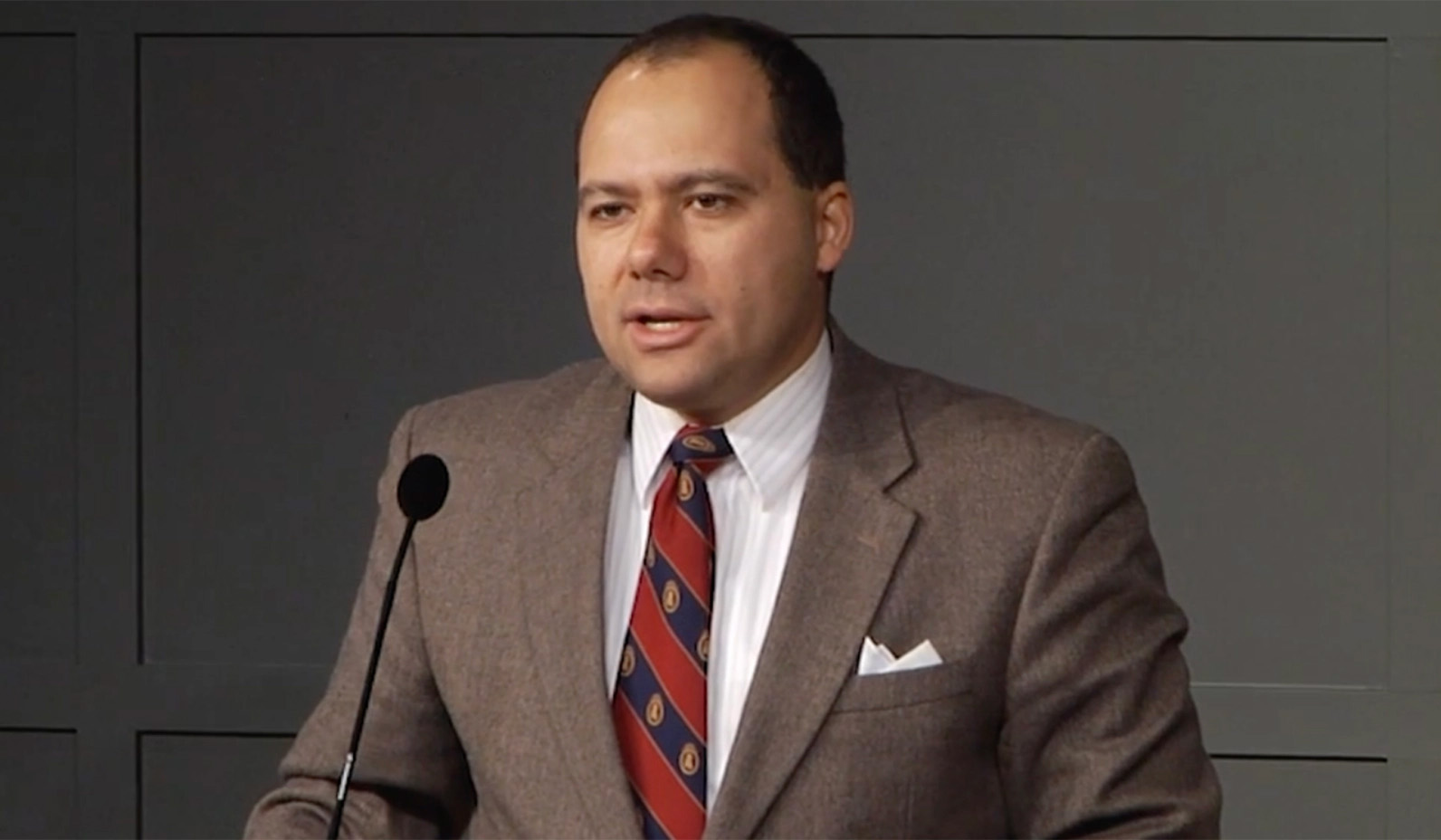Lost in the Bubble
February 16, 2022
Offense of the Month, January 2022
Our designated offender of the month is Ilya Shapiro, the once-about-to-be-and-perhaps-future-executive director of the Georgetown Center for the Constitution, an arm of the law school at Georgetown University in Washington. He was placed on administrative leave one day before he was to start his job on February 1. In a tweet five days earlier, commenting on President Biden’s statement that he would look to appoint a black woman to the Supreme Court seat being vacated when Justice Stephen G. Breyer retires this coming June, Shapiro hurled this thunderbolt:
Objectively best pick for Biden is Sri Srinivasan, who is solid prog & v smart. Even has identity politics benefit of being first Asian (Indian) American. But alas doesn’t fit into latest intersectionality hierarchy so we’ll get lesser black woman. Thank heaven for small favors?
Srinivasan is now chief judge of the U.S. Court of Appeals for the District of Columbia Circuit, perhaps the most significant judicial post below the Supreme Court.
But don’t bother looking for Shapiro’s tweet. It (and one or two that followed) has been deleted (the London-based Daily Mail usefully reprinted the original here).
Within a day, Shapiro offered the ritual apology. The original offending tweet was, he said, “inartful.” That’s one way of putting it. It was inartful, but anyone could have predicted the uproar that followed. How often have we seen supposedly smart people give offense by being careless at their craft? Is there something in the disposition to tweet that gets offenders in trouble or does Ilya Shapiro manage this effect wherever his words land?
Here is his background, taken more or less directly from an online bio. For the past few years he was vice president of the Cato Institute, a libertarian think tank, where he directed the Robert A. Levy Center for Constitutional Studies and was publisher of the Cato Supreme Court Review. Anyone who studies constitutional law, and the legal bodies and personnel who embody it, knows that words and tone matter. Ambiguous and inartful phrases can crash a plan, a law, a program, a candidacy, a job, a career. Certainly Shapiro must have been aware of that risk. He was about to take over a similar position at a more prominent institution deep in the Washington legal establishment. He was writing at a time of broad reckoning with the nation’s racist past and a searching national focus on how to create a more just and fairer society. Yet into that maelstrom this graduate of Princeton and the University of Chicago Law School; this contributor to many prominent publications, including the Wall Street Journal, The Washington Post, USA Today, The Los Angeles Times, National Review, and Newsweek; this Fifth Circuit clerk; this consultant to CBS News; this lawyer who has filed more than 400 amicus briefs in the Supreme Court and testified numerous times before Congress and various state legislatures; this adjunct law professor at George Washington University Law School and the law school at the University of Mississippi—into this charged atmosphere stepped this obvious polymath with the brazen yet incautious challenge to the president of the United States to desist from appointing a “lesser black woman.” Written and dispatched before engaging the cerebral cortex? What did he think would happen?
What happened is that more than 1,000 students and others, so far, have petitioned Georgetown to rescind his appointment, the dean announced he’d be suspended pending an investigation into whether his tweets violated the university’s policies on professional conduct and anti-discrimination, and Shapiro himself apologized for an “inartful” tweet that “undermined my anti-discrimination message.” (A second tweet, also soon deleted, declared that the ultimate appointment will always have an “asterisk attached” to her name.)
It happens that Shapiro is the author of a book on Supreme Court nominations. I haven’t read it, but I expect if I picked it up I’d learn that throughout our history appointments to the Supreme Court almost never land on a single, obvious, universally acclaimed candidate (Justice Benjamin N. Cardozo, in 1932, may have been the only exception, but I can’t be sure because, as I say, I haven’t read the book). But generally, appointments turn on personal and political favors, friendships, politics, optics, regional representation, life experiences, and for the last century (dare this be admitted?), some kind of political balance along ethnic and related attributes. Well, so what, you say? That politics and all the rest of it have always been a part of the process doesn’t make it right, and why shouldn’t an academic point to the “objectively best pick”? Perhaps because there’s no such thing.
And anyway, if you are willing to stick your neck out and proclaim your favorite choice as the undeniably best choice of all the judges in America (and why does the next justice have to be a judge?), is it prudent to go on record in a short bleat devoid of nuance to label the pick from a class of publicly-identified front runners as a “lesser black woman”? Since no particular black woman has been named, his most obvious meaning is that all black women are objectively and necessarily inferior, that “the entire universe of Black female jurists” should be disdained, as Michelle Goldberg put it in The New York Times. Otherwise, why not just say “we’ll get a lesser nominee”?
At least one prominent voice defended Shapiro from the charge that he meant to insult black women as a class. John McWhorter, Columbia University professor of linguistics and an occasional opinion writer for the Times, supposed that Shapiro could not have meant what everyone else has accused him of, because
If Shapiro had wanted to say that Black women are inherently lesser, would he actually have written it for all the world to see? This, after all, would paint him as not just obnoxious, but as someone severely socially impaired. Given how carefully policed so much of our language is these days, why would he deliberately type out a line saying, in essence, that Black women are inferior, somehow missing that this would likely put his new job in jeopardy and draw a wave of social opprobrium? . . . I find the idea of him writing “lesser black woman” in the meaning of “Black women are lesser” psychologically implausible. Shapiro is by all indications intelligent; writing “lesser” and intending it as a blanket judgment would be stupid.
What Shapiro really meant, McWhorter suggests, is that
because Srinivasan is—in [Shapiro’s] view—the “best” of the judges that a Democratic president would consider nominating, any other potential nominee, including any of the Black women on the president’s short list, would be less qualified than Srinivasan. I don’t think Shapiro meant to say that a Black woman would be less qualified because she is a Black woman.
Unless, of course, Shapiro is smart enough to have his cake and eat it too: Smart enough to say what he means and then divert the consequences by adding, “But I could not have meant it, because that would be stupid and I’m smarter than that, which is why you have to interpret what I said as being stupid.” What an excuse! Can you hear one of McWhorter’s students whimper: “But Professor, I couldn’t have meant what you think you understood from those words on my paper because to say that would be stupid and I’m smarter than that.” I generally agree with McWhorter, but I think he errs here. I think Ilya Shapiro is not so smart or, as the evidence suggests, he is socially impaired and maybe even revels in his affliction.
Even assuming he meant to offend, most of his detractors, and for that matter Shapiro himself, seem utterly convinced that however deplorable, his snark does not warrant rescinding his appointment. Academic Freedom 101. Despite her tongue lashing of Shapiro, Michelle Goldberg condemned Georgetown’s move both on grounds of principle and because punishing one who speaks, no matter how offensively, “threatens to undermine the value of academic freedom at a time when that value is under sustained assault in many red states.”
I don’t disagree, but in the curmudgeonly mood that occasionally overtakes me when writing about offenders of the month, I’d propose that Shapiro be investigated, not for violating Georgetown’s moral norms but for objective administrative incompetence and unprofessionalism, for elevating his own brashness over prudence, and for rushing to judgment without regard to his prospective employer’s concerns. Would you want a guy like that on your payroll? But maybe that’s just the sound of a fulminating former academic dean who, getting it from all sides, used to fantasize that just because his colleagues had the right to be offensive didn’t mean that they would ever exercise it. Anyway, unlike Shapiro or the dean, I no longer have colleagues I must placate or a paycheck to protect.
Your email will not be posted on the site if you make a comment.


